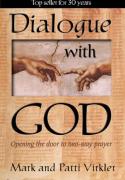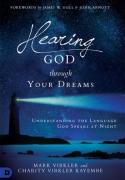For most of us in a 21st-century rational culture, the greatest miracle of all is to learn to hear God's voice, clearly, plainly, and on an ongoing daily basis. The foundational training on the 4 keys to hearing God's voice is discussed here. Christians often debate whether this is even possible. However, those who have tasted communion with God know that not only is it possible, it satisfies the deepest longing of both the human heart and God's heart. For this reason we were created, to fellowship and commune with our Creator. Therefore, it is with arms wide open and faces aglow with the joy of His Son's light that we embrace the warmth of His companionship. Truly, the Morning Star has risen within our hearts and the prophetic word becomes clear to us (2 Pet. 1:19).
However, some days we still experience strong, stormy gales that hinder our access to fellowship with the Father. In this article we want to talk about some of these storms and discuss ways they can be tamed by the power of His Spirit and a knowledge of His ways.
The Tabernacle Experience - God's Design for Approaching Him
First of all, there is a basic approach laid out in the Bible for those who would draw near to God. It is found in the tabernacle experience. The one who wants to experience God in the Holy of Holies (one's spirit) must learn to live this tabernacle experience, which begins with the gate of salvation. We enter this gate with thanksgiving, clothing ourselves with the white raiment of righteousness which Christ has provided for us (Ps. 100:4; Is. 61:10).
We then come immediately upon a brazen altar, where we offer our lives as a living sacrifice, holy and acceptable unto God (Rom. 12:1). We do this not only at the point of salvation, but also as a daily experience, as we awaken each morning.
Next, we come before the laver, where we are washed with the washing of the water of the Word (Eph. 5:26). As we look intently upon the Word, we allow it to cleanse our lives, purifying our actions. Therefore, the pattern of regular Bible meditation becomes a part of our daily approach to God.
Then we enter the holy place, the realm of our souls, and God deals with our minds, wills and emotions. First, we go to the table of showbread, a place where the priests ate together around a table. This represents the fellowship we enjoy in the family of God as we partake together of God's provision. As the grain is ground fine to make the bread, so our wills are ground fine as we fellowship with other believers. As we allow this process to happen, choosing to allow our wills to be ground fine within the bond of unity of the fellowship to believers, we are prepared to go ever further into the depths (heart) of God.
Next, we stop at the golden lampstand, made of beaten gold representing the cultivation of divine nature, and lit by oil, representing the illumination of the Holy Spirit. As we examine the Word under the illumination of the Holy Spirit, we find revelation knowledge pouring into our souls, transforming our lives and taking us even deeper into the presence of God (2 Cor. 3:18).
We then move to the altar of incense, where we learn to offer continuous praise and worship unto the Most High God, the Maker of heaven and earth. As a fragrant aroma ascended perpetually from this altar, so our praise and worship ascends perpetually before the nostrils of the Lord (Ps. 141:2). We have learned to be worshipers. Through revelation knowledge, we have seen that the Most High rules in the affairs of man, and we have learned to worship Him everywhere, in everything (Dan. 4:17). We have learned to worship in spirit and in truth (Jn. 4:24).
Entering the Holy of Holies and Experiencing Direct Fellowship
Now we are ready to ascend directly into His manifest presence, fixing our gaze upon His glory and speaking face-to-face and mouth-to-mouth with the Most High God. Oh, what a privilege! Oh, what glory! To stand and fellowship directly with the Lord of heaven and earth Himself! The veil has been rent, the way has been opened, through the atoning blood of Christ Jesus our Lord and Savior (Heb. 10:19,20).
It is in this manner that God has prepared a way for us to enter before Him and fellowship with His Holy Spirit. The way is clearly established in the Old Covenant and torn open for all to partake in the New Covenant. Now, when storms and gales hinder our access before the King of Kings, we can go back and re-walk the path which He has prepared for us. We can ask:
A Checklist for Tuning Our Hearts to God's Voice
- Am I singing in thankfulness for the robe of righteousness which He has allowed me to put on? Do I see myself wearing it? Do I see myself cleansed and spotless before the King?
- Have I laid down my will in all matters this day, and sought only the will and purposes of the Father in all areas?
- Am I being washed daily by the constant application of the Word of God in my life?
- Is my heart full of love for those in the body of Christ, with whom I live? Have I closed off my heart to any Christian brother? Have I allowed my will to be ground fine before my brothers?
- Am I prayerfully pondering the Word and waiting before the Holy Spirit, allowing revelation knowledge to illumine my life?
- Am I a constant worshiper? Has all grumbling been replaced with worshipping in my life? Do I dwell only on that which is pure, good, honest?
- Do I stand, fixing my gaze on the manifest glory of Almighty God, receiving His spontaneous ideas, visions, and feelings?
And Now, for a Fine-Tuning Dial (Heb. 10:22)!
Usually, I find that if I walk through the tabernacle experience, any block I may have as I approach God in prayer is erased. If not, God has provided a fine-tuning dial in Hebrews 10:22:
"Let us draw near with a sincere heart in full assurance of faith, having our hearts sprinkled clean from an evil conscience and our bodies washed with pure water."
In this verse are found four more keys for removing blocks to effectively hearing the Master's voice. The first key is that we must have a sincere heart. There can be no hypocrisy, no double-mindedness, no halfheartedness. Only total, pure, childlike dedication to the desires and purposes of Almighty God.
Secondly, we must have a full assurance of faith. In other words, we cannot doubt that there is a river flowing within us. We must believe that the spontaneous bubbling that wells up within us as we seek God in prayer is actually God speaking to us and flowing within us (Jn. 7:38,39). If we do not have a fullness of faith, if we doubt that He is "Immanuel," God with us, then we will cut off the flow of His Spirit.
Therefore, we must believe that He is a Rewarder of those who earnestly seek Him, and receive in faith that which is flowing within us, trusting that indeed it is the Spirit of Almighty God (Heb. 11:6). If it is not, then Christianity is a lie. However, I am persuaded that it is the truth.
Thirdly, we must have our hearts sprinkled clean from an evil conscience. If there is sin, it must be brought before the cleansing flow of Christ's blood and removed as far as the east is from the west (Ps. 103:12). Then it must be forgotten, as all of our attention is turned upon our Maker. All nagging unrest must be brought before the purifying blood of Christ for removal. Then the heart is free to soar into the heavens with God.
Finally, we must be cleansed with the washing of water of the rhema word, or the voice of God (Eph. 5:26). Those things which God is speaking to us must be acted upon and obeyed, or our ability to go on with God is destroyed.
When I come before God in prayer, I begin by quieting myself in His presence. I use the eyes of my heart to see Him present with me. I tune to the inner river (i.e., spontaneous flow), and I begin writing down and recording the flow that is welling up within me. (See this pattern in Hab. 2:1,2.)
If I am stuck and some block seems to be hindering my ability to hear God's voice and see His vision, I review the above questions concerning living the tabernacle experience. Often as I go through this checklist, I identify the block and remove it.
If the block still remains, I ask myself the four questions found in Hebrews 10:22. Is my heart sincere, honest, and committed? Am I free of reservations as I approach God? Do I have a full assurance of faith that He is within me and welling up through my spirit (which is joined to His Spirit - I Cor. 6:17)? In addition, I must ask whether I have been obedient to the previous words which God has spoken to me.
Summary: Three Ways of Tuning Our Hearts (4 Keys, Tabernacle Experience and Fine Tuning Dial)
These two patterns, the tabernacle experience, and the fine-tuning dial of Hebrews 10:22, (when coupled with the four keys found in Hab. 2:1,2) offer ready access for most of us almost all of the time, so we can readily hear God's voice within our spirits, and write down the spontaneous flow of thoughts, visions and feelings which bubble up within us as we seek the face of God. Thus, we find that many of the most common blocks and problems to hearing the voice of God are removed as we follow these biblical patterns.
Three Reasons I May Still Find "Errors" in My Journaling
Once we begin recording the things we sense God speaking to us, we may still find errors, or "supposed errors," in our journals. This can come from many things. I will list very briefly only a few of the most common situations.
One problem is that when we pray, we often fix our eyes on the thing we are praying about, rather than on Jesus, the Author and Finisher of our faith. Therefore, the answer comes back from the thing, rather than from our Lord. The solution to this problem is to be very careful to fix our eyes on Jesus (Heb. 12:2), rather than on anything, or person, or issue. If we are bringing a person or issue to God in prayer, then we should actually see ourselves presenting this before Him and watch what He does or says concerning it. Then the spontaneous flow will be more pure.
A second issue is that some of God's commands are simply positioning moves and are never meant to be fully carried out. Instead, God re-directs us in midstream. An example of this may be seen in Genesis 22 when God asked Abraham to sacrifice his son. However, as Abraham began to act in obedience to this order, God changed it, telling him not to sacrifice his son. Now, was Abraham's first word from the Lord wrong? No, God was simply positioning Abraham in order to fulfill one of God's goals for his life. Once the test was completed, God discontinued the action midstream with new orders. I find this happens often in my journal. Many orders are simply positioning moves, both for me and for others.
A third, and final, problem which we will discuss is the problem of improper interpretation. It is very easy to interpret the words of your journal to say what you think they mean, rather than simply seeing them for what they are. Often, as I have gone back to my journal, thinking my journaling had been wrong, I have been amazed to see that the actual words of the journaling were fulfilled. It was my inner interpretation of these words that was not correct. Let us be careful to hear that which the Lord is speaking.
Each of the above points are much more fully developed in two texts by Mark & Patti Virkler: Dialogue with God and 4 Keys to Hearing God's Voice.
This article can also be downloaded for printing as a tract with Adobe Acrobat Reader. Download as: Adobe PDF











